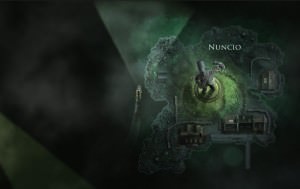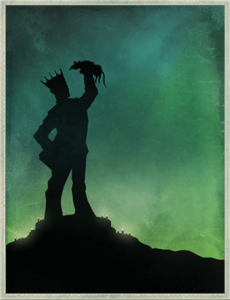The Pull of Nuncio
Note from Failbetter: This is a blog from Emily Short, guest writer on Sunless Sea. She's discussing the narrative design behind Nuncio, an island on the Unterzee which was commissioned by one of our delicious Kickstarter backers. You should probably zail to Nuncio and enjoy the story before reading any further.
Nuncio is the third island I’ve written for Sunless Sea — I also worked on Station III, based on a concept of my own, and Visage, which was a backer-requested island with an intriguing but open-ended brief. For Nuncio, though, there was a more detailed brief than usual: the backer had specific ideas about life on an island filled with rats and postmen, and the tone was more comedic than the other two islands I’d done.

So from the outset I had a clear story arc to work from: the protagonist meets an island of quirky postmen and learns that the island has a supernatural pull on undelivered messages. I broke the arc down into a list of discoveries that the player could make: first find out that the “pull” exists, then learn about its physical and psychological manifestations, then find that it’s been working from this location for a lot longer than London has been Fallen.
Because Sunless Sea is quality-based narrative -- that is, story unlocks dependent on the values of different qualities -- it’s important to think early on about which qualities are going to provide the structure of your story and how they’re going to advance. In this case, I kept it simple: the Learned in Postal Secrets quality would track progression of knowledge, and there would be a few choke-points where the player needed a secondary quality in order to advance further.
Then for each of those steps I worked out a couple of different ways the protagonist could find out the relevant piece of information. You can encounter the Pull yourself by gathering correspondence on Nuncio Beach, or you can be told about it by postmen in the pub. You can gain access to certain areas of the Dead Letter Office by making friends with the postmen and gaining their trust, or by doing enough shiftwork in the office.
Partly this variation was intended to give the island replay value — if you came back to it with a second captain, you wouldn’t necessarily be reading all the same text. Likewise, a player who visited Nuncio many times would learn the fastest way to progress, which would mean that there could be a satisfyingly long story on the first visit but repeat visits would require less work for those focused on the island’s economic rewards.

I had another goal as well: I wanted to let the player choose how much the experience of Nuncio was about getting close to the island’s inhabitants. It’s possible to play through the whole story in a stand-offish way, spending little time in the pub with other characters and focusing on solo exploration; or alternatively you can make it all about getting to know the people. The fact that you can get several kinds of Port Report text reflects this as well: if you do your Port Report right away when you arrive, it will be very different from what you might write after you’ve spent some time on the island and learned its secrets. And yet the Admiralty won’t pay you any differently no matter how detailed your information is: sometimes there’s no mechanical reward for getting to know someone well.
(As a side note: the bergamot-pomegranate curd mentioned in one of the Port Reports is a tip of the hat to Eli Brown’s The Feasts of Tre-Mang, a work that is also about learning to have respect and affection for a set of eccentric islanders.)
More than the other two islands I wrote, Nuncio is designed like a classic adventure around locations, knowledge triggers, and inventory. Go to one location, find something interesting or learn an interesting fact, go use it at another location in order to advance further. To flesh that out, I supplied ways to use each new item or fact unproductively as well as a way to do it right. When you get a sack of dead letters, you can advance the story by taking it to the Dead Letter Office and sorting it, or you can get a chilly reaction from the other postmen by taking it to the Inky Blotter and setting it on fire. There are also a number of branches that let you chat with other characters about what you’ve learned so far.
Nuncio isn’t meant to be a difficult puzzle. There aren’t enough options for the player to get stuck. The capacity for doing “wrong” or non-advancing actions is meant to break up the strict linear progression, and get the player thinking about the logic of the island and what is likely to make a positive difference. The “bad idea” and “optional” story branches also gave me room to introduce some of the sillier elements of the story.
The final structural element is the parcels you can claim at Nuncio Beach or the Dead Letter Office depending on the Something Awaits You value. These parcels help make sure that the player receives some game-economy reward each time she comes to the island. They were also a chance to add references. The whole island was inspired by the rat-sending features of Fallen London and the Ratmas joke, so it seemed obvious to put in a “refused” rat parcel as one of the things you could find on Nuncio, and several of the other parcels refer to Fallen London lore that otherwise might not be mentioned in Sunless Sea.

Putting some goofiness into the side events left me free to go darker with the core story. The backer brief focused on the experience of being a Fallen London postman, and how unpleasant that might be -- all those boxes of semi-feral cats! But I wanted to go beyond the surface discomforts and hint at the compulsive scrupulosity that results from working in a system that treats impossible demands as a moral necessity. The Hairless Postwoman suffers from trichotillomania, a real condition in which people compulsively pull their own hair out. It’s implied that a lot of the other postal workers have developed more or less pleasant coping mechanisms. They are all suffering mentally, even spiritually, because the job of Messenger is so cosmically important in the Fallen London universe but is impossible for them to do completely.
And so the final question of the story is a reflective choice: how do you feel about that? Do you have sympathy for the postmen, or do you look down on them? Or do you not think that the human cost of Nuncio really matters at all?